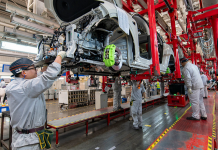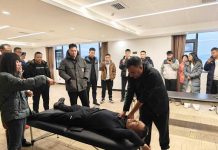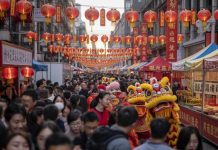“The joy that I have in my work is to see in people’s eyes how amazing China’s business environment is,” Thevenon told Beijing Review.
Thevenon first came to China in 2016 as an exchange student studying at Shanghai Jiao Tong University, where he earned his master’s degree in finance. After graduation, he decided to stay in Shanghai without hesitation, confident that he could find new opportunities in the city. Thevenon has been living in Shanghai for eight years and now promotes Lin-gang Special Area globally and attracts international investment.

Inclusive environment
Established in August 2019, the Shanghai Lin-gang Special Area is part of China’s efforts to further open up its economy. In a speech he gave in Shanghai in November 2019, Chinese President Xi Jinping said the Lin-gang Special Area should be opened in an all-round way, at a deeper level, in a wider field and with greater efforts. It should strive to become an important base to gather talent at home and abroad to carry out international collaboration on innovation, a key hub for the overall development of onshore and offshore businesses, a vital springboard for enterprises to go global and make better use of both domestic and international markets and resources, and a significant testing ground for international economic governance. Since then, Lin-gang has steadily worked toward these goals.
“The most important factor [attracting] a company to settle in the Lin-gang Special Area is its high-level business environment,” said Thevenon.
To support this vision, Lin-gang has implemented several forward-thinking policies designed to attract and retain businesses. According to the 2022 Regulations on the Lin-gang Special Area of China (Shanghai) Pilot Free Trade Zone, the area uses a registration-confirmation system. This system streamlines the administrative process, as the registration department only examines submitted materials to confirm if they are complete and comply with relevant laws. Additionally, overseas investors are entitled to unrestricted yuan or foreign currency remittances for their investment and earnings in the Chinese mainland. This financial flexibility is a significant draw forglobal investors.
Also, Lin-gang is developing robust industrial clusters, including in AI, integrated circuits, biomedicine, smart cars and civil aviation. To support these industries, the area also offers preferential policies regarding land rental and housing.
It implements “national treatment plus a negative list” in foreign direct investment, which means overseas investors receive the same treatment as domestic investors except in areas listed as restricted or prohibited. This policy, combined with strong intellectual property protection, ensures a transparent and fair business environment.
In addition to providing a favorable business climate, Lin-gang focuses on creating a livable, green environment. It provides high-quality educational, medical, and other services to ensure a balanced and comfortable life for its residents.
From 2020 to 2023, actual foreign investment in the Lin-gang Special Area grew at an average annual rate of 45.3 percent, with the number of newly established foreign-invested enterprises increasing from 1,205 to 3,328. Last year, the number of newly established foreign-invested enterprises in Lin-gang rose by 93 percent year on year, accounting for 10 percent of Shanghai’s total.
In May this year, Tesla broke ground on another Gigafactory in the Lin-gang Special Area. This is Tesla’s first energy storage Gigafactory outside the U.S. and will produce Tesla’s Megapack, an ultra-large electrochemical commercial energy storage system. It is expected to have an annual production capacity of 10,000 units, with an energy storage capacity of nearly 40 gigawatt-hours.
“I believe that China’s high-level opening up is driving global economic growth by promoting international trade, attracting foreign investment, and fostering technological innovation, and the Lin-gang Special Area is part of this strategy,” said Thevenon.

Friendly to talent
Attracting talent is as crucial as attracting investment for creating a special economic function zone with significant global market competitiveness. To achieve this, Lin-gang offers many preferential policies and services.
First, international talent working in the Lin-gang Special Area can apply for work-type residence permits with a validity of up to five years. Highly qualified foreign personnel, in-demand professionals, and eligible international investors working in Lin-gang can apply for permanent residence permits, along with their international spouses and minor children.
Second, tax policies are highly beneficial for overseas talent. Highly qualified overseas personnel in short supply can receive government subsidies on their individual income tax.
Last but not least, efficient government services are comprehensive and considerate. The Lin-gang immigration service center provides bilingual support and helps address issues international residents face promptly.
“For example, I needed my individual income tax certificate for the bank, and they helped me get it in two minutes,” said Thevenon.
With these efforts, Lin-gang has attracted over 1,500 foreign talents, including Thevenon, since its establishment, Fu Ziyu, who works at the Lin-gang Special Area Immigration Service Center, told Beijing Review.
“It’s essential to keep an open mind and see what is out there and what the best is. I’m happy to work for China because the world can learn from China’s experience and culture. As China continues to open up, collaboration with the world can lead to a shared future,” Thevenon said.






